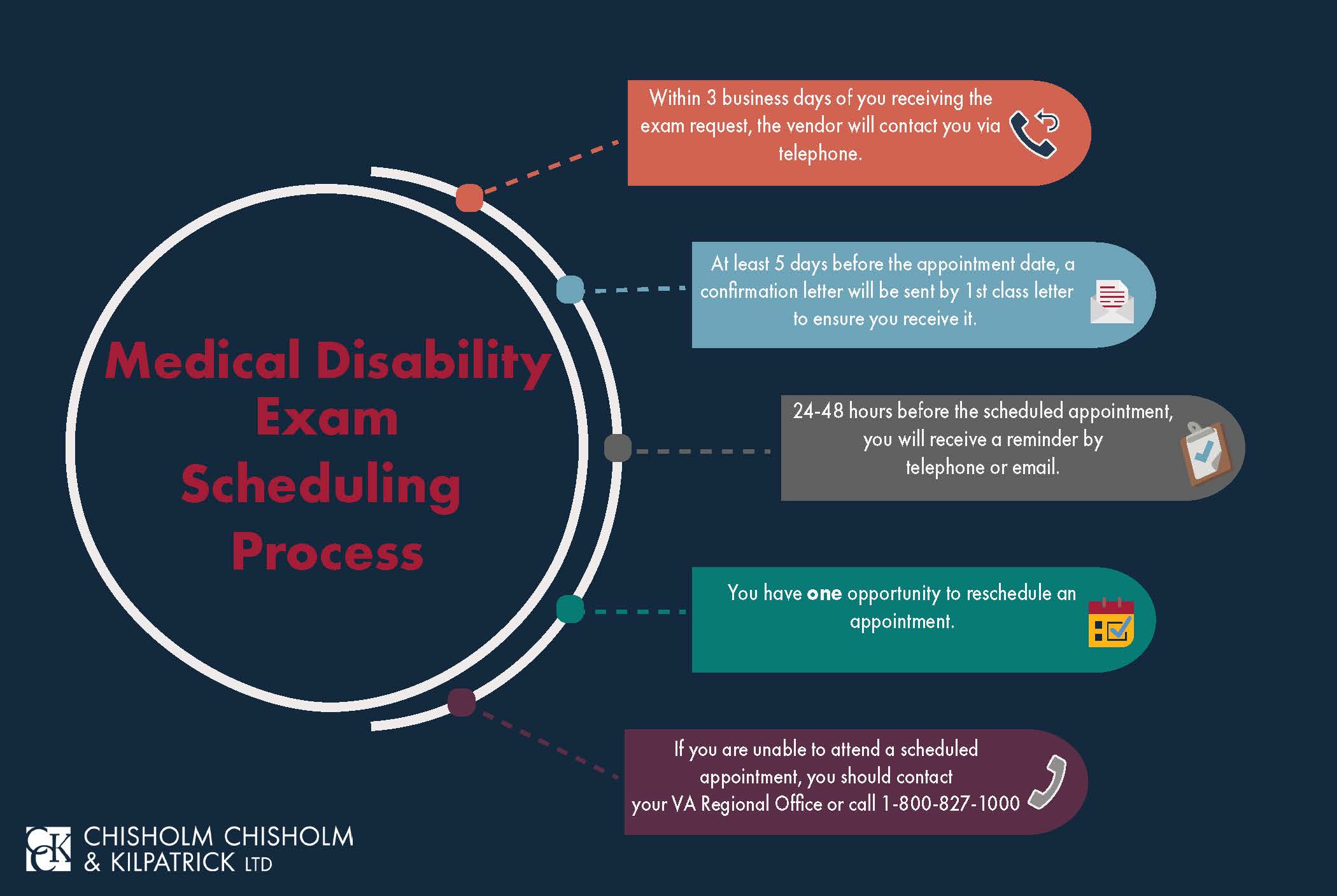Military Medical Disability Examinations (MDE) for VA Disability

CCK Law: Our Vital Role in Veterans Law
Overview of VA Medical Disability Examinations (MDE)
Through the Veterans Benefits Administration (VBA), the Department of Veterans Affairs administers Compensation & Pension (C&P) examinations to veterans, their dependents, and their survivors. A medical examination is a critical piece of evidence for determining the extent of disability, and thus the disability rating that is warranted. As such, the examination and accompanying report must provide the required detailed findings sufficient for VA adjudicators to arrive at an appropriate determination. Due to legislation passed in 2014 which allows VA to outsource more services, an increasing number of veterans are receiving their MDE and C&P exams outside of the Administration.
Examinations given by VA-contracted providers are referred to as medical disability examinations (MDE). VA awarded contracts in 2016 to five private firms to conduct the MDEs: (1) VetFed Resources; (2) Logistics Health Inc.; (3) Medical Support Los Angeles; (4) QTC Medical Services, Inc.; and (5) Veterans Evaluation Services, Inc. However, it has been found that VA does not have the tools to track whether private-sector medical providers are accurately giving examinations that help determine whether veterans are eligible for VA benefits.
GAO Report Regarding VA-Contracted Examinations
In 2018, the Government Accountability Office (GAO) reported that VA lacks the data to determine whether the private-sector providers are meeting standards for quality, timeliness, and accuracy. The GAO focused its investigation on 2017, when contractors conducted 767,000 MDEs – about half of the total examinations that year. The cost of the exams by contractors totaled $765 million. VA set standards for the outside contractors to meet, including for 92 percent of MDE reports to contain no errors. However, GAO found that in the first half of 2017, only one contractor met that target.
Furthermore, contractors are supposed to send their MDE reports to VA within 20 days after they accept a veteran’s examination request. GAO determined that VA lacked the tools to determine whether they met that mark. From there, GAO investigators themselves analyzed the timeliness of 646,005 examinations that contractors completed between February 2017 and January 2018. Of those examinations, 306,479 (slightly more than 50 percent) were completed within the 20-day timeframe. 69,748 claims (12 percent) took 40 days, double the targeted time.
GAO’s Recommendations
At the end of its report, GAO made four recommendations to better track and analyze the contractors’ performance:
- Recommendation 1: The Under Secretary for Benefits should develop and implement a plan for how VBA will use data from the new exam management system to oversee contractors, including how it will capture accurate data on the status of exams and use it to (1) assess contractor timeliness; (2) monitor time spent correcting inadequate and insufficient exams; and (3) verify proper exam invoicing.
- Recommendation 2: The Under Secretary for Benefits should regularly monitor and assess aggregate performance data and trends over time to identify higher-level trends and program-wide challenges.
- Recommendation 3: The Under Secretary for Benefits should document and implement a plan and processes to verify that contracted examiners have completed required training.
- Recommendation 4: The Under Secretary for Benefits should collect information from contractors or examiners on training and use the GAO report information to assess training and make improvements as needed.
Since these findings and recommendations, VA has worked to improve its delivery and contracting of C&P examinations and MDEs. From October 2018 through August 31, 2019, VA completed 1,493,797 examinations and 4,767,984 Disability Benefits Questionnaires (DBQs).
Medical Disability Examination (MDE) Program Office Overview
The Medical Disability Examination Program Office (MDEPO) consists of four teams which manage the MDE program: (1) operations; (2) acquisitions; (3) quality; and (4) training and DBQ management. In collaboration, these teams ensure vendors complete quality and timely MDEs for veterans and service members. VBA is mandated to route examination requests to Veterans Health Administration (VHA) C&P clinics until capacity is reached before routing to MDE vendors. Once the examination request is routed, an Examination Request Routing Assistant (ERRA) makes recommendations based on the veteran’s home address, pending contentions, and VHA capacity per examination type.
National Mission: VA Medical Examinations
The National Mission goal is to complete VA compensation examinations through Pre-Discharge programs, which conduct disability examinations while on active duty. This enables service members to receive VA compensation benefits immediately following discharge. There are two types of examinations completed under the Pre-Discharge program: (1) Integrated Disability Evaluation System (IDES); and (2) Benefits Delivery at Discharge (BDD). Importantly, QTC Medical Services, Inc. is the only MDE vendor completing Pre-Discharge examinations.
Integrated Disability Evaluation System (IDES)
IDES is a VA and Department of Defense (DoD) collaborative program designed to improve the disability process and facilitate transition for service members facing potential medical discharges. Here, service members only need to undergo one examination and separate DoD and VA examinations are not required. Service members are enrolled into IDES by their military service department.
Benefits Delivery at Discharge (BDD)
BDD is a pre-discharge program for service members who are not referred to IDES and wish to file a claim for VA benefits up to 180 days prior to discharge.
Below is the number of contracted examinations completed for the National Mission during the following fiscal years:
- Fiscal Year 2017: 26,638 BDD examinations and 18,441 IDES examinations
- Fiscal Year 2018: 27,698 BDD examinations and 17,921 IDES examinations
- Fiscal Year 2019 (as of November 2019): 28,575 BDD examinations and 18,997 IDES examinations
Overseas Contract Examinations
In addition to multiple locations in the United States, VBA now contracts in 33 locations across the world. The following numbers of contracted examinations have been completed overseas:
- Fiscal Year 2017: completed 7,873 overseas examinations
- Fiscal Year 2018: completed 14,448 overseas examinations
- Fiscal Year 2019 (as of November 2019): completed 12,948 examinations
Importantly, only Veterans Evaluation Services, Inc. perform pre-discharge examinations overseas.
How to Schedule an MDE
After VBA refers to an MDE vendor, the vendor contacts the veteran via telephone within three business days of the examination request receipt date. From there, a confirmation letter is sent as certified mail to ensure receipt by the veteran at least five days prior to appointment date. If the vendor is unable to contact the veteran by telephone, appointment information must be sent by tracked to ensure receipt by the veteran at least 5 days prior to the scheduled appointment. Vendors must then follow up with the veteran by telephone or electronic method 24-48 hours prior to the scheduled appointment. Importantly, veterans only have one opportunity to reschedule an appointment. If veterans need to reschedule, they should contact the VA Regional Office or call 1-800-827-1000 if unable to attend appointments offered by the vendor or if they were unable to attend the scheduled appointment.
MDE Travel Considerations
It is important to note that MDE vendors attempt to schedule examinations at the facility nearest to the veteran’s home. MDEs are scheduled no farther than 50 miles for non-specialty examinations and 100 miles for specialty examinations, depending on the veteran’s availability. However, veterans can agree to travel outside the mileage limitations if they are capable of doing so. In remote geographical areas with limited examiners, MDEs may need to be scheduled further than contract guidelines. Here, travel reimbursement is paid in full to eligible veterans once all examinations have been completed and accepted by the VBA (generally within 3 weeks of the examination). The current mileage reimbursement rate is 41.5 cents per mile.
Increasing Accountability and Ensuring Quality
The MDE quality team is fully staffed. Furthermore, quality reviews for vendor-completed DBQs are up-to-date and the quality staff is providing more frequent feedback with more current data/information than ever before. For example, the MDE quality team engages in the following to increase accountability and ensure quality:
- Monthly random sample pulls of DBQs for review
- Error citation reports sent and quality calls with vendors monthly
- Vendor Guidance Memos (VGMs)
- Quarterly quality reports
- Vendor site visits
Source: Compensation Service- Medical Disability Examination (MDE), Veterans Benefits Administration, October 2019
About the Author
Share this Post

